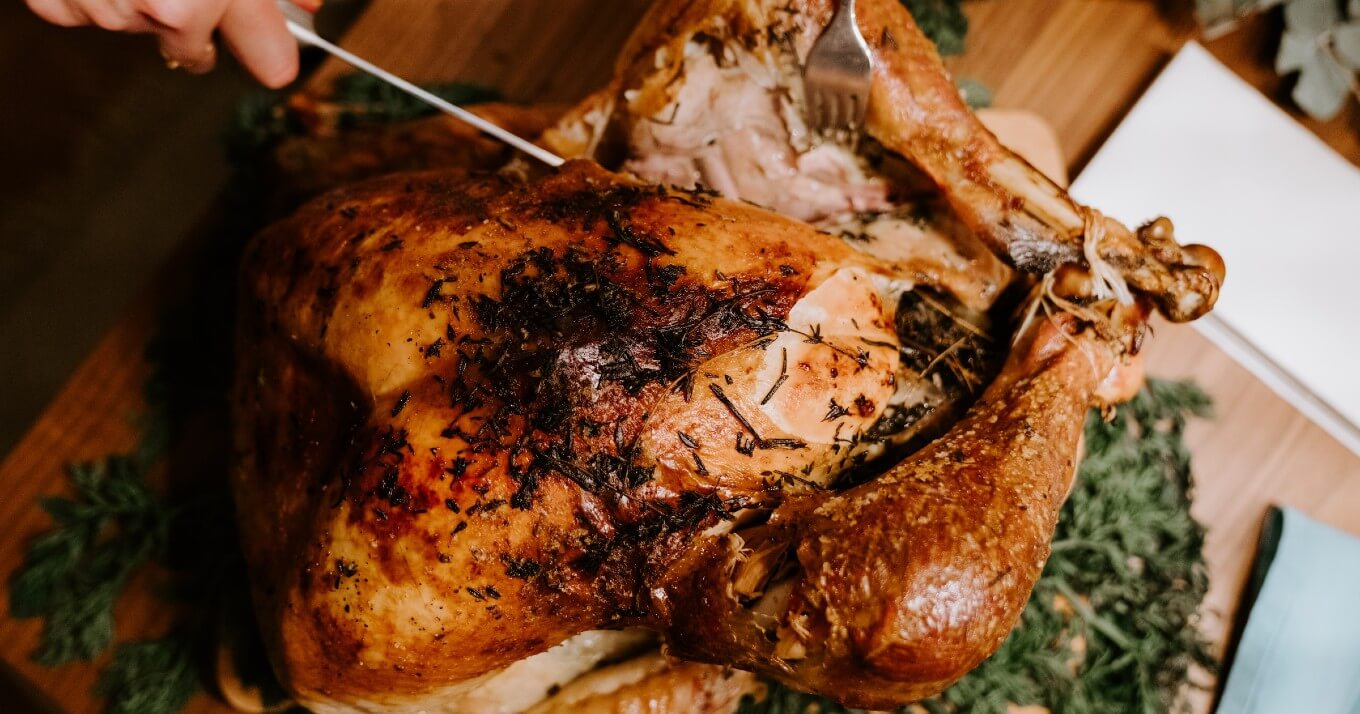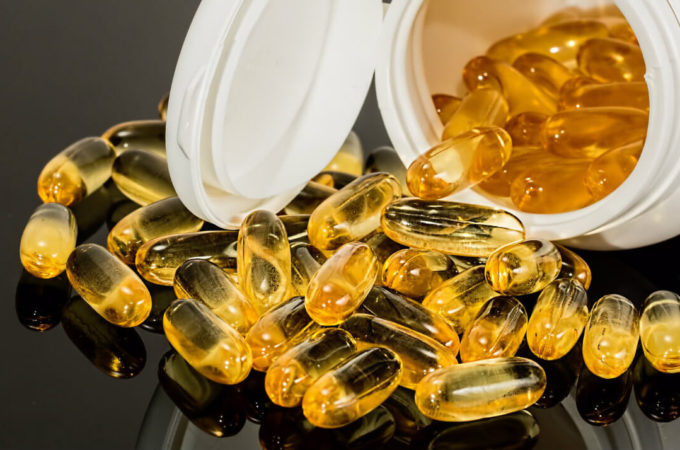
As the price of meats continues to skyrocket in the US, consumers need to be extra cautious about exactly what they’re buying. In a day and age when industrial food manufacturers bring us 100% orange juice that’s not really 100% juice, or shredded cheese packed with wood pulp, is it any surprise that when you pay $4.99/lb for a supermarket turkey (even an “organic” one), you’re actually buying a “bird” that’s typically 40% salt water?
Brined turkey has something going for it — built-in grace. Accidentally leave your bird in the oven for a half hour too long? It’s okay! A brined turkey will still be moist and tender.
But that doesn’t mean the food manufacturers have your best cooking interests in mind when they sell you a brined bird. Nah. They’re just adding weight. After all, who in their right mind would want to pay extra for salt water and wind up with far less meat than they bargained for? If your store-bought turkey is labeled “enhanced” or “flavor enhanced” or “self-basting” or “basted,” it has been injected with a salt water solution during the packaging process. Often, this solution contains nasty additives like vegetable oils and emulsifiers.
While U.S. law does require that these “enhanced” meats be labeled, the labels are only required to be clear if they’re intended to be part of the product — i.e. “Teriyaki Beef in a Teriyaki Sauce.” However, single-ingredient “natural” products like turkey may be injected with a brine too, and those labels are often inconspicuous and hard to find. As it stands, the labeling may be hidden near the Nutrition Facts or ingredient labels, may be small enough to hide in plain sight, and may not fully list the ingredients in the brining solution.
According to Mother Earth News, “Organic” poultry is no exception:
Organic regulations don’t prohibit injection, which is standard procedure for processing meats like hams, but the ingredients in the brine are restricted.
Even raw poultry labeled as “natural” can include these suspect brining solutions:
All raw single ingredient meat and poultry qualify as “natural.” However, certain products labeled as natural may also contain a flavoring solution provided the solution contains ingredients that are minimally processed and not artificial; e.g., natural flavoring. The amount of solution added to products bearing natural claims is not limited. (source)
In other words, you could be buying a certified organic, all-natural turkey at Whole Foods, and it could be up to 40% solution and only 60% turkey!
Not only is this cheating customers out of their hard earned money, but it’s also serving up a stealth hit of sodium that can adversely affect people with heart disease and high blood pressure.
In theory, I wouldn’t object to buying a brined bird so long as two conditions were met: 1) that the brine ingredients be clearly labeled as something I would concoct in my own kitchen, and 2) that the price were reduced accordingly. I see no reason to pay a premium price for salt, water, and herbs.
But, of course, that’s not what happens! Instead, innocent shoppers are hoodwinked into buying less meat for more money, all in the name of having a moist, self-basting turkey for the holidays.
So, what can you do?
First, stick to buying holiday turkeys and hams from farmers you know and trust. (Isn’t that my go-to solution for all things food-related?) Your meat will be more nutritious and flavorful. You may even find a heritage breed to buy and enjoy.
Second, look carefully at the entire label and avoid buying any turkey or ham that’s labeled “enhanced” or “flavor enhanced” or “self-basting” or “basted.” No reason to pay too much money!
And finally, brine your turkey yourself! If you’ve bought a pastured hen, this is almost guaranteed to be a necessity unless you’re slow-roasting your turkey or using deliciously moist stuffing. Pastured poultry tends to be more dry than conventional poultry unless you know how to cook it right.
(Photo by Claudio Schwarz)
 |
















Another couple: You can grow your own (chicken is a good substitute) or simply ditch the foul fowl tradition and opt for wild caught salmon or some other yummy food that’s not suspect.
My family has recently taken to bucking the holiday system in favor of non-traditional, themed meals that are usually ethnic. No turkey or ham in sight. I guess they got bored after a lifetime of turkey and decided they wanted something different!
Very timely post, and so useful. The only point I could add is this – Not only does the salt water contain low quality industrial salt and the nasty emulsifiers, it almost certainly contains tap water full of fluoride, chlorine, and other nasty chemicals.
But the best thing to do is exactly as you said – buy a pastured bird from a farmer you know and trust.
Excellent point! The industrial water supply is certainly suspect.
A day late and a dollar short. It’s too late to order a pastured turkey at this point. Not for Christmas though…
Makes my almost $50 pastured local bird not look like such a bad deal. 🙂
No kidding!
I’m all about getting it from someone you trust but we all know most folks won’t. I don’t see the big problem buying a bird that has been brined. First of all they’re cheap. 40% of cheap is still cheap. It’s what makes them taste good. It’s what you’ll do with your pastured bird. Brinig is a lot of work. I’m sure none of y’all work for free.
I like brined meat but would rather do it myself so I have control over what is going in as well as getting a more honest price per pound. Brining a turkey is so simple it’s DIY time.
The last three years I’ve bought a local, pastured turkey from my grass farmer. The first year I brined it, but haven’t since. It’s not necessary with the birds I’ve been getting. And there’s no horrid formaldehyde scent as it roasts!
Unfortunately, I just had a terrible experience with a locally pastured turkey. It was badly bruised, with a hole in one wingpit that was engorged with a large amount of blood. After much effort to clean and prepare it for roasting, it turned out dry after being roasted by my mother, the world champion turkey roaster. Her turkeys are always most and tender, but this one was quite a disappointment. I would not order one again.
It has been a while since I have purchased ANY poultry at the grocery store, including organic! Why? I do read the fine print. Always. Thank you for confirming what I learned. I will continue to read. . . .the fine print.
This year I roasted a 26 pound turkey that we raised ourselves. It was fabulous! Juicy, and sooo flavorful! Very worth it!
I bought my first locally grown turkey last year and cooked it for Thanksgiving. I brined it myself and it was amazing! The bone broth I made from the carcass was delicious, too! Not a piece of that bird went to waste!
This is one complaint I don’t understand.
When I buy corn beef brisquet I expect that is in a brine.
When I buy bacon or ham I expect that it has been brined.
When I buy a turkey I’m darn glad it’s been brined because if it hasn’t then I have to brine it myself, which I do for non-brined turkey.
The price reflects the brining. Non-brined turkey costs more because it hasn’t had the water added yet.
Let’s focus on something more interesting and important.
Important? It is for people on low sodium diets, and those who care about what they are eating.
I grow my own!!! A properly raised and harvest turkey needs NO brine!!!!
Better yet, go to the woods and shoot the damn bird yourself.
I didn’t know that about pasture raised turkey (being dry)…. so how does one make brine?
Exactly. This article kind of dumped on with only half the solution. 🙂
A turkey poult can easily cost more than a store bought turkey! And then there is the raising. Turkeys can be a HARD animal to raise! That means for the novice, they better buy several poults (at very high prices) with hopes of having one left by Thanksgiving.